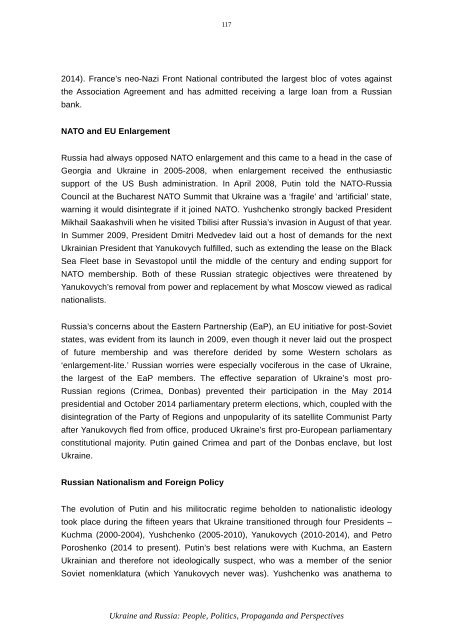Ukraine-and-Russia-E-IR
Ukraine-and-Russia-E-IR
Ukraine-and-Russia-E-IR
Create successful ePaper yourself
Turn your PDF publications into a flip-book with our unique Google optimized e-Paper software.
117<br />
2014). France’s neo-Nazi Front National contributed the largest bloc of votes against<br />
the Association Agreement <strong>and</strong> has admitted receiving a large loan from a <strong>Russia</strong>n<br />
bank.<br />
NATO <strong>and</strong> EU Enlargement<br />
<strong>Russia</strong> had always opposed NATO enlargement <strong>and</strong> this came to a head in the case of<br />
Georgia <strong>and</strong> <strong>Ukraine</strong> in 2005-2008, when enlargement received the enthusiastic<br />
support of the US Bush administration. In April 2008, Putin told the NATO-<strong>Russia</strong><br />
Council at the Bucharest NATO Summit that <strong>Ukraine</strong> was a ‘fragile’ <strong>and</strong> ‘artificial’ state,<br />
warning it would disintegrate if it joined NATO. Yushchenko strongly backed President<br />
Mikhail Saakashvili when he visited Tbilisi after <strong>Russia</strong>’s invasion in August of that year.<br />
In Summer 2009, President Dmitri Medvedev laid out a host of dem<strong>and</strong>s for the next<br />
Ukrainian President that Yanukovych fulfilled, such as extending the lease on the Black<br />
Sea Fleet base in Sevastopol until the middle of the century <strong>and</strong> ending support for<br />
NATO membership. Both of these <strong>Russia</strong>n strategic objectives were threatened by<br />
Yanukovych’s removal from power <strong>and</strong> replacement by what Moscow viewed as radical<br />
nationalists.<br />
<strong>Russia</strong>’s concerns about the Eastern Partnership (EaP), an EU initiative for post-Soviet<br />
states, was evident from its launch in 2009, even though it never laid out the prospect<br />
of future membership <strong>and</strong> was therefore derided by some Western scholars as<br />
‘enlargement-lite.’ <strong>Russia</strong>n worries were especially vociferous in the case of <strong>Ukraine</strong>,<br />
the largest of the EaP members. The effective separation of <strong>Ukraine</strong>’s most pro-<br />
<strong>Russia</strong>n regions (Crimea, Donbas) prevented their participation in the May 2014<br />
presidential <strong>and</strong> October 2014 parliamentary preterm elections, which, coupled with the<br />
disintegration of the Party of Regions <strong>and</strong> unpopularity of its satellite Communist Party<br />
after Yanukovych fled from office, produced <strong>Ukraine</strong>’s first pro-European parliamentary<br />
constitutional majority. Putin gained Crimea <strong>and</strong> part of the Donbas enclave, but lost<br />
<strong>Ukraine</strong>.<br />
<strong>Russia</strong>n Nationalism <strong>and</strong> Foreign Policy<br />
The evolution of Putin <strong>and</strong> his militocratic regime beholden to nationalistic ideology<br />
took place during the fifteen years that <strong>Ukraine</strong> transitioned through four Presidents –<br />
Kuchma (2000-2004), Yushchenko (2005-2010), Yanukovych (2010-2014), <strong>and</strong> Petro<br />
Poroshenko (2014 to present). Putin’s best relations were with Kuchma, an Eastern<br />
Ukrainian <strong>and</strong> therefore not ideologically suspect, who was a member of the senior<br />
Soviet nomenklatura (which Yanukovych never was). Yushchenko was anathema to<br />
<strong>Ukraine</strong> <strong>and</strong> <strong>Russia</strong>: People, Politics, Propag<strong>and</strong>a <strong>and</strong> Perspectives


